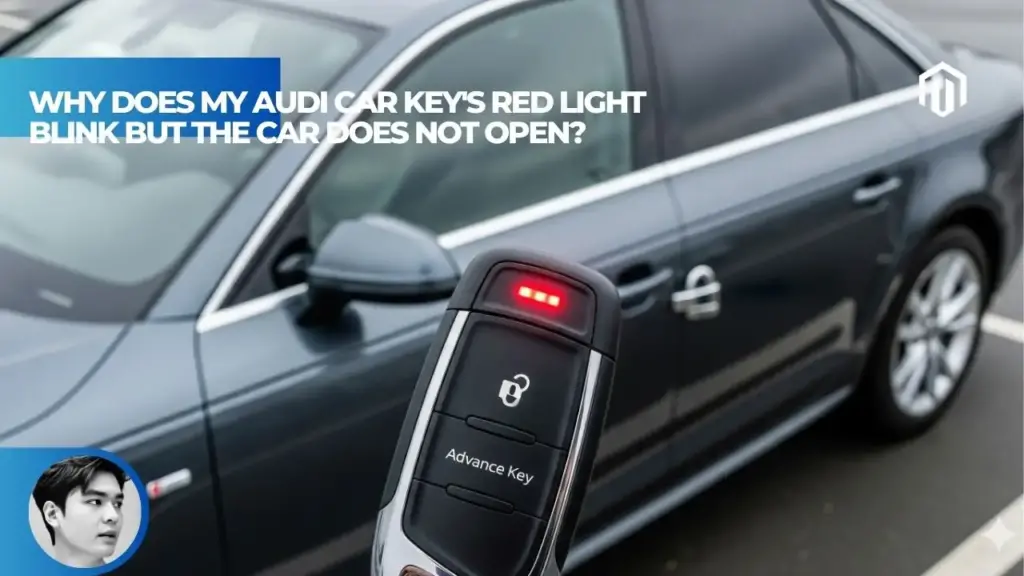You may also like:
The most common reason your Audi key fob’s red light blinks but won’t unlock the car is a low CR2032 battery that has enough power to light the LED but insufficient strength to transmit a signal to the vehicle’s receiver. About 85% of these cases resolve with simple battery replacement[1]. Other causes include desynchronization (especially after battery replacement), weak car battery affecting the receiver, signal interference, or corroded battery contacts[2].
Most Common Causes and Quick Diagnosis
Before diving into fixes, identify which problem you’re dealing with[1]:
| Cause | Frequency | Key Symptoms | Quick Test |
|---|---|---|---|
| Low fob battery | ~85% | Reduced range, multiple presses needed | Replace CR2032 |
| Desynchronization | ~8% | Happens after battery swap or car battery disconnect | Resync procedure |
| Weak car battery | ~4% | Dashboard electronics acting erratic | Test voltage (should be 12.4V+) |
| Signal interference | ~2% | Works in some locations, not others | Move to open area |
| Central locking fault | ~1% | Manual locking also fails | Check fuse box |
Battery-related issues dominate this problem. Desynchronization is specifically common after DIY battery replacements when owners don’t follow the resync procedure[2].
Step 1: Replace the Key Fob Battery
This fix solves the problem 85% of the time. Here’s how to do it correctly[3]:
Opening the Key Fob
- Locate the release button on your Audi key fob (usually on the back)
- Press the release while sliding out the emergency metal key blade
- Use the blade (or a small flathead screwdriver) to carefully pry open the fob housing
- Remove the old CR2032 battery and note which side faces up (positive side typically faces you)
Installing the New Battery
- Insert a fresh CR2032 lithium battery with the correct polarity
- Before closing, inspect the battery contacts for corrosion or debris
- Clean any corrosion with a cotton swab and rubbing alcohol
- Snap the housing back together and reinsert the metal key blade
The catch? A new battery doesn’t always solve it immediately. If your fob was completely dead for an extended period, it may have lost synchronization with your vehicle[4].
Step 2: Resync the Key Fob After Battery Replacement
Many Audi owners replace the battery, find the fob still doesn’t work, and assume the key is broken. In reality, it just needs resyncing[5].
Method 1: Door Lock Resync (Works on Most Audis)
This method uses your physical key to re-establish communication[1]:
- Unlock your vehicle manually using the hidden mechanical key blade
- Insert the metal key blade into the driver’s door lock cylinder
- Turn the key to the unlock position—just to the first resistance point, not fully
- While holding the key turned, press and hold the unlock button on your key fob
- Continue holding both for a full 10 seconds
- During this time, you should hear the door locks cycle (lock/unlock rapidly)
- Release the fob button and remove the key from the door lock
- Test all fob buttons—unlock, lock, trunk, and panic
This method tells the vehicle “this key fob is authorized” by combining physical key presence with the electronic fob signal[1].
Method 2: Ignition Resync (For Older Audis 2010-2018)
This alternative works particularly well for older model years[1]:
- Enter your vehicle and ensure all doors are fully closed
- Insert the key into the ignition cylinder and turn to accessory position
- Immediately press and hold the unlock button on your key fob
- Keep holding the unlock button continuously for 10 seconds
- While still holding unlock, turn the ignition to start position (engine on)
- Allow the engine to run for 10 seconds while continuing to hold unlock
- Release the button, turn off the engine, and remove the key
- Exit the vehicle and test all key fob buttons from outside
If you recently had your emergency key trigger the alarm, your key may also need this resync procedure.
Method 3: MMI System Pairing (2019+ Models)
Newer Audis with MMI systems offer a menu-based option[6]:
- Enter the vehicle using the mechanical key
- Start the car using the key fob held against the steering column
- Navigate to MMI > Vehicle Settings > Central Locking
- Look for “Pair Key” or similar option
- Follow on-screen instructions to complete pairing
Some models also allow key management through the Audi Connect app[6].
Other Causes and Fixes
If battery replacement and resyncing don’t work, investigate these possibilities.
Weak Car Battery Affecting the Receiver
Your vehicle’s 12-volt battery powers the remote receiver module. When the car battery weakens, the receiver may not operate correctly[1].
Symptoms include:
- Dashboard electronics behaving erratically
- Engine cranks slowly or struggles to start
- Multiple electrical warnings on instrument cluster
- Key fob suddenly stopped working after vehicle sat unused
- Remote receiver works immediately after jump-starting
Test your car battery voltage—it should read 12.4V or higher. If it’s below 12V, the battery likely can’t power the keyless entry receiver properly[2].
If your car won’t start in cold weather despite a good battery, cold temperatures may also be affecting key fob signal strength.
Signal Interference
Radio frequency interference can block the signal between your fob and vehicle[2]. Common sources include:
- Metal parking structures
- Buildings with heavy shielding
- Nearby transmitters or chargers
- Other electronic devices in your pocket
Test by trying the fob in an open area away from buildings. If it works there but not in your garage, interference is the culprit.
Corroded Battery Contacts
Even with a fresh battery, corroded contacts prevent proper electrical connection[3]. Open the fob and look for:
- Green or white buildup on metal contacts
- Discoloration around the battery housing
- Bent or damaged contact springs
Clean with isopropyl alcohol and a cotton swab. For severe corrosion, lightly scrape with a small file or fine sandpaper.
Faulty Lock Actuator
If only one door fails to respond, the door lock actuator may be the issue rather than the key fob[7]. Symptoms include:
- Other doors lock/unlock normally
- You can hear the motor trying to engage
- Manual locking from inside also fails
This requires professional diagnosis and potential actuator replacement.
When to Visit the Dealer
Some situations require professional equipment[7]:
| Situation | Why Dealer Is Needed |
|---|---|
| Both key fobs fail identically | Problem likely in vehicle’s central locking system |
| Resync procedures don’t work | Key may need reprogramming with VCDS/OBDeleven |
| Key was washed or water-damaged | Internal damage may require fob replacement |
| Immobilizer issues | Requires dealer diagnostic equipment |
| Lost all working keys | New key requires dealer programming |
Dealer programming for a new key fob typically costs $200-400 including the fob itself[1]. Third-party locksmiths with Audi-compatible equipment may offer lower prices.
If your key was accidentally laundered, internal water damage may require complete fob replacement rather than repair.
Signs Your Key Fob Battery Is Dying
Catch these warnings before you’re locked out[1]:
- Key fob only responds within 1-2 inches of the door handle
- You must press buttons multiple times before getting a response
- Red LED appears dim or flickers during button presses
- Fob works intermittently—succeeding occasionally but failing most attempts
- Reduced range compared to when the fob was new
Most Audi key fobs use CR2032 batteries lasting 2-3 years with normal use. Proactive replacement prevents this frustrating scenario entirely.
Key Takeaways
- 85% of “blinking but not unlocking” cases resolve with CR2032 battery replacement—the LED can light up with insufficient power to transmit the actual unlock signal[1]
- Always resync after battery replacement using the door lock method (insert key, turn to unlock, hold fob unlock button 10 seconds) since disconnecting power often breaks the fob-vehicle pairing[1]
- Check your car’s 12V battery if the fob suddenly stops working—voltage below 12V can prevent the receiver module from picking up key fob signals[2]
- Test in an open area to rule out signal interference from metal structures, chargers, or other electronics that can block the RF signal[2]
- If both key fobs fail identically, the problem is in the vehicle (central locking system, receiver, or fuse) rather than the keys themselves[7]
- Dealer visit required for immobilizer issues, lost keys, or failed resync attempts—expect $200-400 for new fob with programming[1]
FAQs
Why does my Audi key fob light blink but not unlock the car?
The red LED blinks to confirm button press—it doesn’t indicate the signal was received by your car[2]. A weak battery has enough power to illuminate the LED but insufficient strength to transmit a proper signal to the vehicle’s receiver module. This is the most common cause, affecting approximately 85% of cases. Replace the CR2032 battery and resync the fob if the problem persists after installation.
How do I resync my Audi key fob after changing the battery?
Insert the mechanical key blade into the driver’s door lock, turn to the unlock position, and while holding it there, press and hold the unlock button on your fob for 10 seconds[1]. You should hear the locks cycle rapidly. Release both, then test all fob functions. If this method fails, try the ignition resync method or check your MMI system for a “Pair Key” option on newer models.
Can a dead car battery cause the key fob to stop working?
Yes. Your car’s 12-volt battery powers the receiver module that picks up key fob signals[1]. When the car battery drops below approximately 12V, the receiver may not function properly even though your key fob battery is fine. Symptoms include the key suddenly stopping working after the vehicle sat unused for days or working immediately after a jump start. Test your car battery voltage—it should read 12.4V or higher.
Why won’t my Audi key fob work even with a new battery?
Most likely desynchronization—the fob lost its pairing with the vehicle during the battery swap[4]. This is especially common when the old battery was completely dead before replacement. Perform the door lock resync procedure: insert the metal key in the door lock, turn to unlock position, hold the fob’s unlock button for 10 seconds, then test. Also check that you installed the battery with correct polarity and that contacts aren’t corroded.
How much does it cost to replace an Audi key fob?
A replacement Audi key fob from the dealer typically costs $200-400 including programming[1]. Third-party automotive locksmiths with Audi-compatible diagnostic equipment may charge $150-300. Just the CR2032 battery costs $3-8 at most stores. Before paying for a replacement, try all resync methods—the fob may be perfectly functional and simply needs re-pairing with your vehicle.
References
- Autvex. (2025). Why Does My Audi Car Key’s Red Light Blink But the Car Does Not Open? https://autvex.com/why-does-my-audi-car-keys-red-light-blink-but-the-car-does-not-open/
-
The Tools Trunk. (2025). Audi Remote Key Not Working | 5-Minute Fixes That Work.
Audi Remote Key Not Working | 5-Minute Fixes That Work
- YouTube – Steven Harper. (2024). New Battery & ReSynchronising Key Fob [Audi TT]. https://www.youtube.com/watch?v=nnUUAqLu9F0
-
Reddit r/Audi. (2023). One remote keeps blinking red light after unlocking the car.
One remote keeps blinking red light after unlocking the car – Audi a3 8p 2010
byu/Reddylive1989 inAudi - Audizine Forum. (2023). Remote key-fob not working, but key still starts car. https://www.audizine.com/forum/showthread.php/173805-Remote-key-fob-not-working-but-key-still-starts-car
- YouTube – Nexology. (2025). How To Reset Audi Q5 Key Fob – Resync After Battery Change.
- YouTube – Nexology. (2025). How to Fix Audi Key Fob Not Unlocking Car.

I am a senior automotive analyst at Autvex. Expert vehicle evaluations, in-depth reviews, and objective analysis helping readers make informed automotive decisions with years of industry experience.









